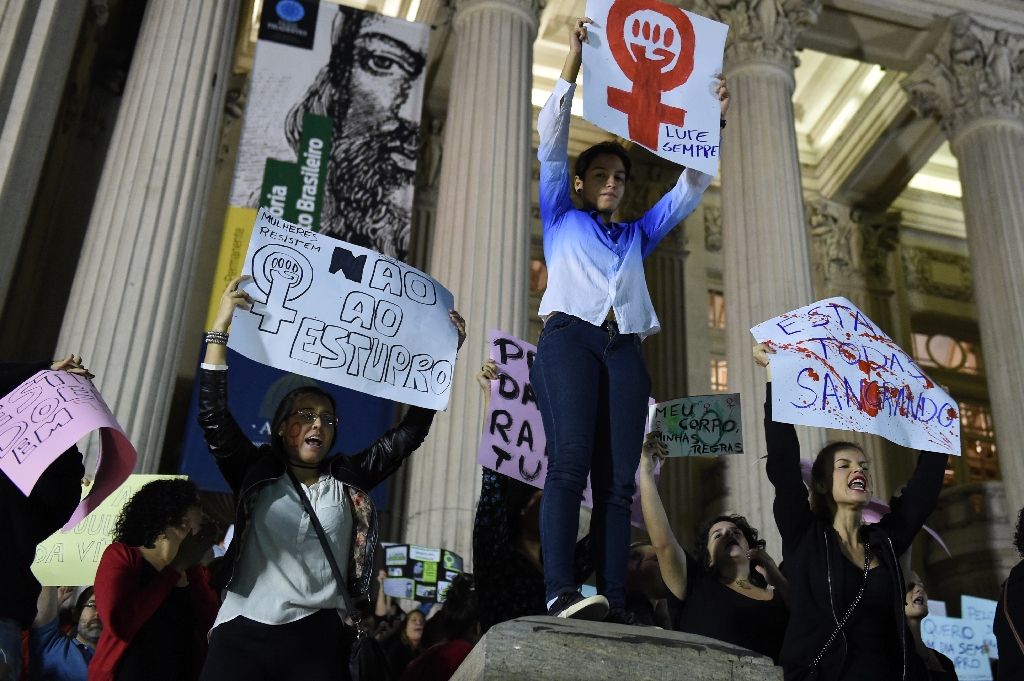TW: Rape, sexual assault, victim-blaming.
When I first saw the news that a teenage girl had been gang-raped by over 30 men in Brazil, I couldn’t even bring myself to read about it. I purposely don’t click on the links to these kinds of news stories any more. But when it emerged that in light of the attack, protesters scattered hundreds of pairs of red and white (with red stains) pants across Copacabana beach, set amongst huge images of women with red-blood handprints across their mouthes, I had to suck it up and read.

These protests are an act of defiance. The images capture Brazil’s problem with violence against women (VAW) and force you to pay attention. They show abuse as multifaceted by depicting the women up close as hurt as well as resilient, scared, and expressionless. ‘The photos are part of an art project by photographer Marcio Freitas, entitled “I will Never Be Silent”‘, a fitting name as tens of thousands of protesters also took to the streets in major cities across Brazil calling for an end to VAW after the news of this assault emerged.
The attack saw one 16 year old girl violently gang-raped by more than 30 men. She went to her boyfriend’s house, ‘and was briefly alone with him, but remembered nothing afterward until she woke up naked the next day in another building with dozens of men who had guns’. Her Grandma said in an interview that her boyfriend had organised the assault because he thought she was cheating on him.
As though this wasn’t sickening enough, the attackers also took photos of the attacks and of the victim bloodied and semi-conscious, and uploaded them to Twitter.
The images got more 500 “likes” before being taken down by the site.
But it doesn’t end there. After these images surfaced and the victim was identified, she then received a tidal wave of abuse from strangers telling her that she was asking for it, and sent her death threats. Even the police officer in charge of the investigation asked the victim if she had a habit of participating in group sex.
Every part of this story is horrific and unimaginable, as I was researching for this post, reading the details of the attack upset me, as it would anyone. But the part that really got to me was reading that even after the assault, and the images being taken, and them being circulated around social media, she was still blamed for what had happened to her. And I realised that the reason this got me so upset ,that I had to leave the house and have a little cry, was because this happens all. the fucking. time.
This is what rape culture is encapsulated in one deplorable attack, and the fact of the matter is these attacks are happening every single day. The reaction the survivor received from strangers could only be possible in a society that constantly blames victims of sexual assault for their attacks. Rape culture dehumanises women as objects, and men as not in control of their own actions. It is a culture of telling women not to walk home in the dark alone, but brushing off men’s harmful behaviour as “boys will be boys”.
It is a culture that constantly tells women not to get raped, but never tells men not to rape.
Make no mistake, this is not an isolated incident. This is not a small group of rogue individuals who think it is acceptable to treat women this way. It is not a minority of “idiots” and these people certainly do not have “mental issues”. Rapists are not trolls who hide under bridges. They are human beings with jobs, families, and lives.
VAW is a universal epidemic, and rape culture facilitates that. Last week we heard about the Stanford rapist who was given a 6 month jail sentence for raping an unconcious woman. Last month a 15 year old girl in India was gang-raped and died after being set on fire, prior to this, 50,000 rapes had been recorded in Brazil in 2014 alone, and the real figure is thought be 10x that amount. In fact, during the same weekend that this attack took place another teenage victim was drugged and raped by five men in the north of Brazil.
Rather than dismissing these attacks as “just one of those things” or a part of life, we need to have a conversation about violence against women, and commit to some form of action to stop it. It never has been, and never will be sufficient to acknowledge the severity of these crimes and that they need to stop, whilst ignoring the culture that validates perpetrators and puts the victims on trial.
Feminist writer Stephanie Ribeiro spoke out about rape culture after the attack saying:
‘Violence against women in Brazil is so normalized that 30 men not only rape: They take pictures, joke around and post on social networks gloating about their crime. Before you say we don’t have rape culture — think about that. Or before you say my fear of going out on the street is hysteria… This is not a disease, it is not madness: it is the normalization of evil against us women’.
The recent attacks in Brazil may be a constant reminder of the world we live in, but the outrage these incidents have triggered, and the fact that people are no longer standing for it is a sign of hope that one day things will change.
In a TV interview the girl was asked what would she wish on her attackers. She said “a daughter”.
I hope for that too.
Amy Walker
